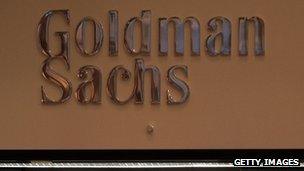Goldman's pay: Sticky on the way down
- Published
- comments

The long-running crisis in the eurozone meant that the appetite for taking risks of companies and investors declined last year.
And when companies and investors choose to keep their money safe rather than putting it to work, there's a drop in fees, commissions and dealing spreads for investment banks such as Goldman Sachs.
So it is only to be expected that in 2011, Goldman Sachs' net revenues fell 26% to $28.8bn, net earnings dropped 47% to $4.4bn and earnings per share dropped exactly two thirds.
But what many will see as striking is that the remuneration of employees - what Goldman calls compensation and benefits - fell by less, 21%, to $12.2bn.
And on a per head basis, the fall was 15%, to average remuneration for Goldman's 33,300 employees of $366,000 (pay per head fell less than total remuneration because Goldman reduced staff numbers by 7%).
It is very intriguing that the rewards for investment bankers seems to defy financial gravity: their pay and rations rose so sharply in the bubble years before the crash of 2007/8, but don't seem to fall commensurately in these leaner times.
Plainly if you're a banker, this asymetry in performance-related pay - soaring in a boom years but dribbling lower in a softer economy - is simply marvellous.
For example with Goldman's pay per head falling 15%, it is pretty hard for our own Royal Bank of Scotland or Barclays to slash their respective rewards for investment bankers.
As for the rest of us, we might observe that in a banking profession that lives and breathes markets every second of a 24-hour trading day, market forces don't seem to apply very effectively to the setting of their own pay.
Update 15:19
PS Goldman has emailed to say the following: "For the record, discretionary compensation (ie bonuses) declined significantly more than revenues in 2011." Which presumably means that a significant proportion of pay is fixed or non-discretionary.